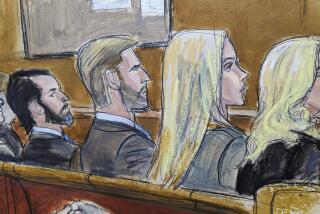Dzhokhar Tsarnaev has rights
- Share via
On Monday morning, Boston bombing suspect Dzhokhar Tsarnaev was charged with using a weapon of mass destruction. According to a transcript of that proceeding, a magistrate at Tsarnaev’s hospital bedside read him the Miranda warning, informing him of his right to counsel and his right to remain silent. But among the things we don’t know is if, or to what extent, Tsarnaev was interrogated before being informed of his rights.
Over the weekend, Atty. Gen. Eric H. Holder Jr. gave every indication that he intended to have Tsarnaev questioned without the Miranda warning. We have to hope that didn’t happen. The Constitution is not like a deck chair, to be brought out in good weather and then put away and ignored when the seas get rough. Tsarnaev is entitled to the same constitutional protections as any other criminal defendant.
The Constitution provides protections to all those accused of crime, including the privilege against self-incrimination, the right to counsel, the right to a speedy trial in front of a jury, and the right to have guilt proved beyond a reasonable doubt.
FULL COVERAGE: Boston Marathon attack
There is no exception in the Constitution, or ever recognized by the Supreme Court, for especially horrible crimes or for ones that can be labeled terrorism.
But that never seems to stop officials from looking for exceptions during crises. In addition to Holder’s remarks, Republican Sens. John McCain and Lindsey Graham called over the weekend for Tsarnaev to be held as an enemy combatant and tried in a military tribunal, an idea that was fortunately rejected.
Since 9/11 there has been a debate, still unresolved, as to what constitutional protections apply to those apprehended in foreign countries and held as enemy combatants. But there is no doubt that a crime in the United States must be investigated and prosecuted in accord with the Constitution.
This is not the first crime of terrorism in an American city. The anarchists of the early 20th century, the attackers in the first World Trade Center bombing and Timothy McVeigh and Terry Nichols, who were convicted of the bombing of the federal building in Oklahoma City, to mention a few, were prosecuted and tried in compliance with the Constitution.
It is striking that in all of these instances, the government succeeded in gaining convictions in courts. In other words, complying with the Constitution is not an obstacle to successful law enforcement. The federal judiciary, and likewise state courts, have shown repeatedly that they are capable of handling such cases. And even if complying with the Constitution were to make prosecution more difficult, that would not be a sufficient reason for suspending it.
Holder said on the Sunday talk shows that the government intended to invoke the “public safety exception” that allows suspects to be questioned without being given Miranda warnings in emergency circumstances. But this exception does not apply here because there was no emergency threat facing law enforcement.
The emergency exception to Miranda that Holder embraced was announced by the Supreme Court in New York vs. Quarles in 1984. A woman told the police that she had been raped by a man with a gun. When the police caught the suspect in a grocery store, they saw an empty holster and no gun. The man was asked about the location of the gun, and he told the officer where to find it.
The Supreme Court ruled that, although the suspect had not yet been given Miranda warnings, the statement about the gun was admissible against him because of the urgent need to find the gun. In other words, the public safety exception applies only when police are acting in an emergency to prevent serious immediate harm. If the police needed to question Tsarnaev as to the location of other bombs, the emergency exception would apply.
But Holder has said that no such threat exists. It appears then that the attorney general’s intention to allow questioning of Tsarnaev without reading him his rights would violate Tsarnaev’s 5th Amendment rights. That could well mean that any incriminating statement he were to make would be excluded from use as evidence.
And what about the idea advanced by McCain and Graham that Tsarnaev should be treated as an enemy combatant and prosecuted in military courts? It’s unlikely we’ve heard the last of it.
But the Constitution does not — and should not — permit trying American civilians in military tribunals. A verdict from a military tribunal, no matter how fair the proceedings, never would have the credibility of a conviction from a federal court. More important, there is no stopping point to the erosion of the Constitution; why couldn’t any crime that caused significant loss of life be deemed an act of terror and the suspect denied constitutional protection?
Throughout American history, whenever there has been a serious threat, people have proposed abridging civil liberties. When that has happened, it has never been shown to have made the country safer. These mistakes should not be repeated. Dzhokhar Tsarnaev should be investigated, prosecuted and tried in accord with the U.S. Constitution.
Erwin Chemerinsky is dean of the UC Irvine School of Law.
More to Read
A cure for the common opinion
Get thought-provoking perspectives with our weekly newsletter.
You may occasionally receive promotional content from the Los Angeles Times.









